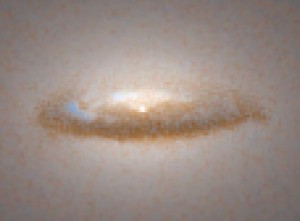General Relativity (Physics 364)
Sean Carroll, Physics Department, University of Chicago
Winter quarter, 2005

(black hole at the center of galaxy NGC 7052, from Astronomy Picture of the Day)
Description
Physics 364 is the graduate course in general relativity, Einstein’s theory of gravitation as the curvature of spacetime, a subject which has become an increasingly necessary part of the graduate curriculum. Aside from being a fundamental pillar of modern physics, and hence something that should be familiar to any educated person, general relativity is nowadays used all the time in astrophysics, cosmology, and high-energy theory.
Different students will bring a wide variety of backgrounds to the course, and our goal will be to try to keep everybody happy and interested. Thus, the basics of special relativity etc. will be covered, although briefly. The emphasis will be on the foundations and applications of general relativity, with occasional glimpses into advanced topics which can be ignored if you wish.
Grading: The final grade will be based 60% on problem sets and 40% on a take-home final exam. You are encouraged to talk to your fellow students about the problem sets, but make sure that what you hand in is produced by you.
Dates
The course will meet Mondays and Wednesdays from 12:00 to 1:30 p.m. in Kersten 105.
The final exam will be a twenty-four hour take-home final, from noon March 10th to noon March 11th.
Personnel
Sean Carroll, Professor
Iggy Sawicki, Grader
Outline
- Special Relativity
- Manifolds
- Spacetime Curvature
- Gravitation
- Black Holes
- Gravitational Radiation
- Cosmology
Problem Sets
Problem sets will be handed out on Wednesdays, due the following Wednesday.
- Problem Set One, due 19 Jan
- Problem Set Two, due 26 Jan
- Problem Set Three, due 2 Feb
- Problem Set Four, due 9 Feb
- Problem Set Five, due 16 Feb
- Problem Set Six, due 23 Feb
- Problem Set Seven, due 2 March
Books
- S.M. Carroll, Spacetime and Geometry: An Introduction to General Relativity (Addison-Wesley, 2003). (Required.)
What did you think, I was going to use some other book? My book has its own web page, which is good considering all the errata that have accumulated. - R. Wald, General Relativity (Chicago, 1984). (Recommended.)
This is the best supplement if you want to go beyond what is in my book, into more advanced topics. You won’t need it for this course, but you might want it anyway. - B.F. Schutz, A First Course in General Relativity (Cambridge, 1985). (Recommended.)
This is an excellent book, at a slightly lower level than the present course. Good for brushing up on your special relativity, and expressing GR concepts in a language familiar from other physics courses. - S. Weinberg, Gravitation and Cosmology (Wiley, 1972).
A very useful although idiosyncratic look at the subject, developed from first principles. An excellent reference, although probably not the place to start. - C. Misner, K. Thorne and J. Wheeler, Gravitation (Freeman, 1973).
Even more idiosyncratic, although in a completely opposite direction from Weinberg. Encyclopedic, but slightly dated in places. Also really big. - R. D’Inverno, Introducing Einstein’s Relativity (Oxford, 1992).
A lesser-known but extremely useful text, once you get past the weird stuff on special relativity at the beginning. Offers clear expositions of important topics at about the level of this course. - S.W. Hawking and G.F.R. Ellis, The Large-Scale Structure of Space-Time (Cambridge, 1973).
A classic, offering a no-nonsense overview of some advanced topics, especially exact solutions and singularity theorems. - B. Schutz, Geometrical Methods of Mathematical Physics (Cambridge, 1980).
Another good book by Schutz, this one covering some mathematical points that are left out of the GR book (but at a very accessible level). Included are discussions of Lie derivatives, differential forms, and applications to physics other than GR.
Other Resources
- My Lecture Notes on General Relativity from a similar course taught at MIT in 1996. This course will be shorter and slightly modified, but the notes are still going to be a very useful reference. This page also has links to further resources.